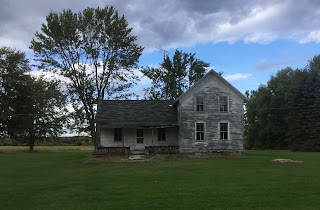I have been very happy that I have. I have full confidence in this high tech object. It’s nice to be able to give it a glance rather than twisting my head around to see what’s behind. It has become a fun toy checking traffic, even when there is no need to. I’ve generally relied on my ears to detect the sound of traffic coming up. This helps confirm what they may or may not be picking up.
And it’s nice to have a mirror if I have to look at in accessible spot on my body for ticks. There have been none so far in this cold. I did have a slug slip into my tent and nestle in the recessed nozzle on one of my water bottles, attracted by a residue of chocolate milk. The bottle was empty, so I luckily didn’t squirt it into my mouth. I only discovered the intruder when I filled the bottle with water and squeezed it to rinse it out in the sink of a library. It was quite a surprise to all of a sudden have a tiny slug squirming in the sink.
Another surprise that I don’t particularly welcome has been roads suddenly turning into hard-packed dirt or gravel. Such roads may be a fad among some cyclists, but I don’t enjoy them at all. I would have thought this car state would be fully paved. At least unsurfaced roads mean a minimum of traffic, as cars want to avoid them too. The out-of-the-way locales such roads take me through generally bring an extra abundance of Trump signs. They are a genuine phenomenon, if not blight on the land. They don’t just outnumber Biden signs, they totally overwhelm them. I can go all day without seeing a Biden sign, while the Trump signs are non-stop. Many are homemade or arranged in a shrine of a sort.
Trump signs dominate small towns too, but the larger ones, such as Ann Arbor and Port Huron bring out the Biden supporters. I was glad a Carnegie Library brought me to Port Huron, as it has long stirred my imagination of what this most eastern city in Michigan at the tip of Lake Huron and entry-point to Canada was like. As I approached from the south along the St. Clair River, the Canadian side of Sarnia was dominated by large oil tanks and industry. The Michigan side was residential. I greatly longed to cross over to Canada and the one hundred Carnegies in Ontario, but Americans continue to be barred entry.
All the small town libraries I had stopped at, including the Carnegie in Armada, thirty miles to the west, were allowing patrons entry.
I couldn’t take advantage of the “Armada Free Library,” as I arrived in the early evening after it had closed. It was a modest brick building with a sizeable addition to its side. A sign in front of the addition echoed the engraving across the top of the Carnegie.
After forest-camping my first four nights, I was able to camp alongside a corn field for the first time a little ways out of Armada.
There was just a thin strip of forest separating me from several homes set back aways. It was my first campsite within range of human habitation, but I was confident no one would be out wandering in the cold.










2 comments:
Y'know, I've heard the British, back in the olden days, were also fond of the Armada free Library...in fact, Armada free everything! ;0) Safe travels, George!
Bill in KC
I was wondering how long it would take you to mention the fascist militias in that Great Lakes state.
Did you know that SDS was founded in Port Huron.
Post a Comment